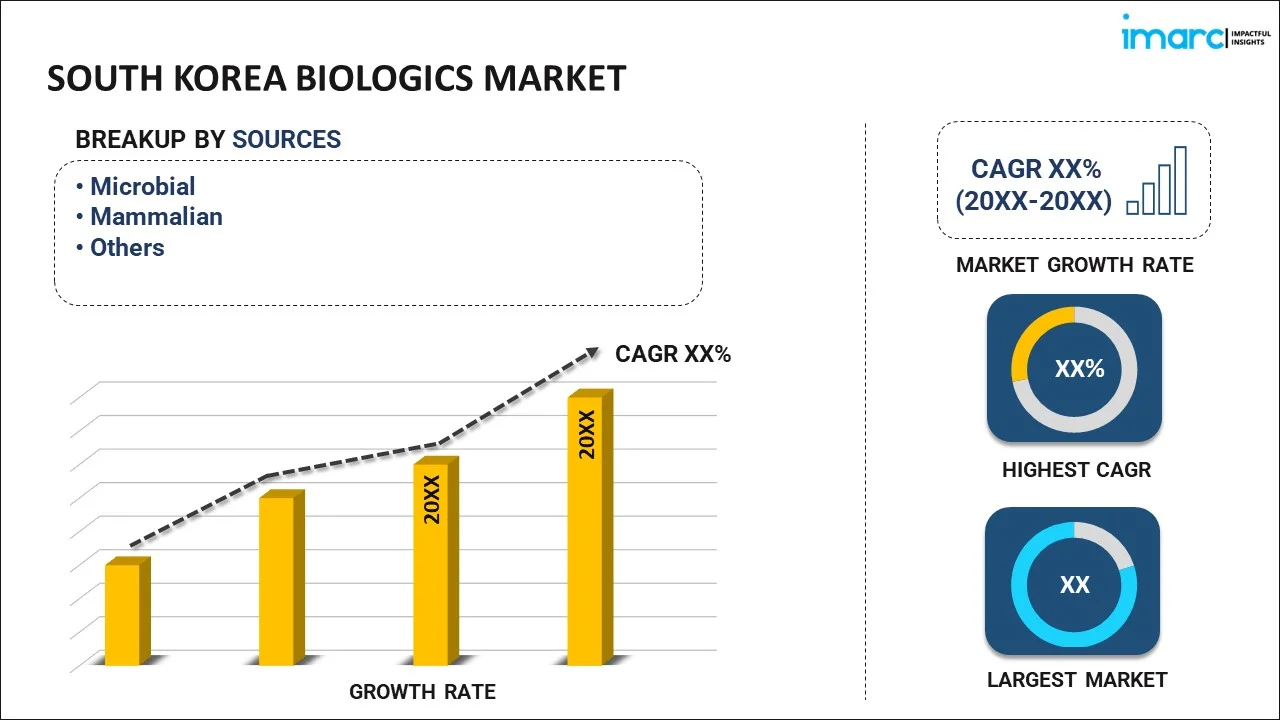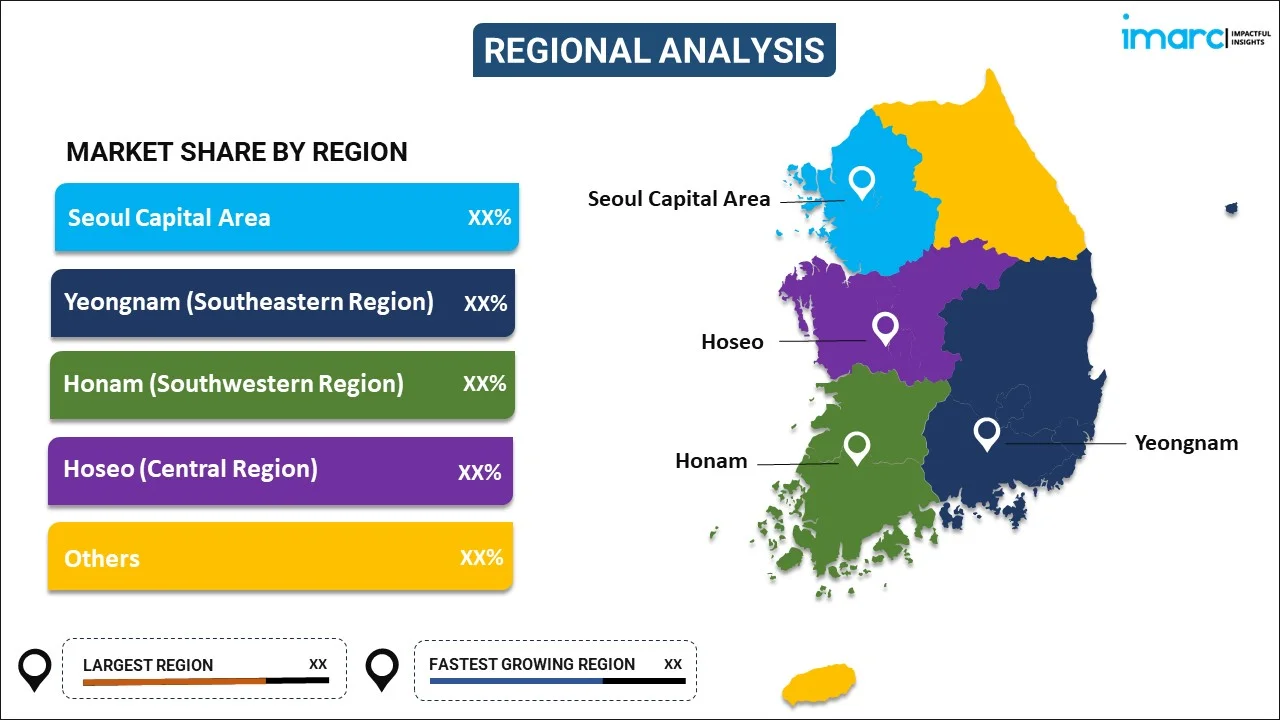
South Korea Biologics Market Report by Source (Microbial, Mammalian, and Others), Product (Monoclonal Antibodies, Vaccines, Recombinant Proteins, Antisense, RNAi and Molecular Therapy, and Others), Disease (Oncology, Immunological Disorders, Cardiovascular Disorders, Hematological Disorders, and Others), Manufacturing (Outsourced, In-House), and Region 2025-2033
Market Overview:
South Korea biologics market size reached USD 7,196.4 Million in 2024. Looking forward, IMARC Group expects the market to reach USD 12,984.9 Million by 2033, exhibiting a growth rate (CAGR) of 6.78% during 2025-2033. The increasing government's substantial investment in biotechnology and life sciences, the rising strategic collaborations with global biopharmaceutical companies, and the emerging trend towards personalized medicine across the globe represent some of the key factors driving the market.
|
Report Attribute
|
Key Statistics
|
|---|---|
|
Base Year
|
2024 |
|
Forecast Years
|
2025-2033
|
|
Historical Years
|
2019-2024
|
| Market Size in 2024 | USD 7,196.4 Million |
| Market Forecast in 2033 | USD 12,984.9 Million |
| Market Growth Rate (2025-2033) | 6.78% |
Biologics, a frontier in pharmaceutical development, are complex medicines manufactured from living organisms, including humans, animals, and microorganisms. These products are manufactured using biotechnology, involving processes such as recombinant DNA technology, controlled gene expression, and antibody technologies. They encompass a diverse range of product types, including monoclonal antibodies, vaccines, recombinant proteins, gene therapy, and cell therapy. They offer targeted treatment options for various diseases, particularly those where traditional small-molecule drugs fall short. Additionally, they are particularly prominent in the treatment of chronic diseases, including cancer, rheumatoid arthritis, and diabetes, due to their ability to interact with specific targets in the body. Their specificity and efficacy translate into fewer side effects and better patient outcomes. They are driving innovation in personalized medicine, offering treatments tailored to individual patients' needs.
South Korea Biologics Market Trends:
The biologics market in South Korea is majorly driven by the government's substantial investment in biotechnology and life sciences. This vision aims to bolster South Korea's position as a leading biologics hub by fostering research, development, and commercialization of biopharmaceuticals. Along with this, the aging population in South Korea is increasing the demand for advanced therapeutic options, including biologics, to treat chronic and age-related diseases. The country's strong intellectual property laws and regulatory framework provide a conducive environment for innovation and attract foreign investment. In addition, South Korea's advanced technological infrastructure and skilled workforce are critical enablers for the development and manufacturing of biologics. The trend towards personalized medicine is also driving the growth of the biologics market in South Korea. As healthcare moves towards more customized treatment approaches, biologics offer the precision and efficacy required for such therapies. Moreover, South Korea's strategic collaborations with global biopharmaceutical companies are also a significant trend, helping to transfer knowledge and technology, thus enhancing local capabilities in biologics research and manufacturing. Apart from this, the expansion of healthcare expenditure and insurance coverage for biologic treatments by the South Korean government is fueling the market. In confluence with this, the rapid advancement in biotechnology, including gene editing and cell therapy, is significantly supporting the market. This progress is coupled with increasing clinical trials and research activities in biologics, focusing on a wide range of therapeutic areas. Furthermore, South Korea's proactive approach to adapting to emerging technologies and its commitment to nurturing a biotech-friendly ecosystem are pivotal in driving growth and innovation in its biologics market. Some of the other factors driving the market include technological advancements and changing consumer preferences.
South Korea Biologics Market Segmentation:
IMARC Group provides an analysis of the key trends in each segment of the market, along with forecasts at the country level for 2025-2033. Our report has categorized the market based on source, product, disease, and manufacturing.
Source Insights:

- Microbial
- Mammalian
- Others
The report has provided a detailed breakup and analysis of the market based on the source. This includes microbial, mammalian, and others.
Product Insights:
- Monoclonal Antibodies
- Vaccines
- Recombinant Proteins
- Antisense, RNAi and Molecular Therapy
- Others
A detailed breakup and analysis of the market based on the product have also been provided in the report. This includes monoclonal antibodies, vaccines, recombinant proteins, antisense, RNAi and molecular therapy, and others.
Disease Insights:
- Oncology
- Immunological Disorders
- Cardiovascular Disorders
- Hematological Disorders
- Others
The report has provided a detailed breakup and analysis of the market based on the disease. This includes oncology, immunological disorders, cardiovascular disorders, hematological disorders, and others.
Manufacturing Insights:
- Outsourced
- In-House
A detailed breakup and analysis of the market based on the manufacturing have also been provided in the report. This includes outsourced and in-house.
Regional Insights:

- Seoul Capital Area
- Yeongnam (Southeastern Region)
- Honam (Southwestern Region)
- Hoseo (Central Region)
- Others
The report has also provided a comprehensive analysis of all the major regional markets, which include Seoul Capital Area, Yeongnam (Southeastern Region), Honam (Southwestern Region), Hoseo (Central Region), and Others.
Competitive Landscape:
The market research report has also provided a comprehensive analysis of the competitive landscape. Competitive analysis such as market structure, key player positioning, top winning strategies, competitive dashboard, and company evaluation quadrant has been covered in the report. Also, detailed profiles of all major companies have been provided.
South Korea Biologics Market Report Coverage:
| Report Features | Details |
|---|---|
| Base Year of the Analysis | 2024 |
| Historical Period | 2019-2024 |
| Forecast Period | 2025-2033 |
| Units | Million USD |
| Scope of the Report | Exploration of Historical and Forecast Trends, Industry Catalysts and Challenges, Segment-Wise Historical and Predictive Market Assessment:
|
| Sources Covered | Microbial, Mammalian, Others |
| Products Covered | Monoclonal Antibodies, Vaccines, Recombinant Proteins, Antisense, RNAi and Molecular Therapy, Others |
| Diseases Covered | Oncology, Immunological Disorders, Cardiovascular Disorders, Hematological Disorders, Others |
| Manufacturings Covered | Outsourced, In-House |
| Regions Covered | Seoul Capital Area, Yeongnam (Southeastern Region), Honam (Southwestern Region), Hoseo (Central Region), Others |
| Customization Scope | 10% Free Customization |
| Post-Sale Analyst Support | 10-12 Weeks |
| Delivery Format | PDF and Excel through Email (We can also provide the editable version of the report in PPT/Word format on special request) |
Key Questions Answered in This Report:
- How has the South Korea biologics market performed so far and how will it perform in the coming years?
- What has been the impact of COVID-19 on the South Korea biologics market?
- What is the breakup of the South Korea biologics market on the basis of source?
- What is the breakup of the South Korea biologics market on the basis of product?
- What is the breakup of the South Korea biologics market on the basis of disease?
- What is the breakup of the South Korea biologics market on the basis of manufacturing?
- What are the various stages in the value chain of the South Korea biologics market?
- What are the key driving factors and challenges in the South Korea biologics?
- What is the structure of the South Korea biologics market and who are the key players?
- What is the degree of competition in the South Korea biologics market?
Key Benefits for Stakeholders:
- IMARC’s industry report offers a comprehensive quantitative analysis of various market segments, historical and current market trends, market forecasts, and dynamics of the South Korea biologics market from 2019-2033.
- The research report provides the latest information on the market drivers, challenges, and opportunities in the South Korea biologics market.
- Porter's five forces analysis assist stakeholders in assessing the impact of new entrants, competitive rivalry, supplier power, buyer power, and the threat of substitution. It helps stakeholders to analyze the level of competition within the South Korea biologics industry and its attractiveness.
- Competitive landscape allows stakeholders to understand their competitive environment and provides an insight into the current positions of key players in the market.
Need more help?
- Speak to our experienced analysts for insights on the current market scenarios.
- Include additional segments and countries to customize the report as per your requirement.
- Gain an unparalleled competitive advantage in your domain by understanding how to utilize the report and positively impacting your operations and revenue.
- For further assistance, please connect with our analysts.
 Request Customization
Request Customization
 Speak to an Analyst
Speak to an Analyst
 Request Brochure
Request Brochure
 Inquire Before Buying
Inquire Before Buying




.webp)




.webp)












